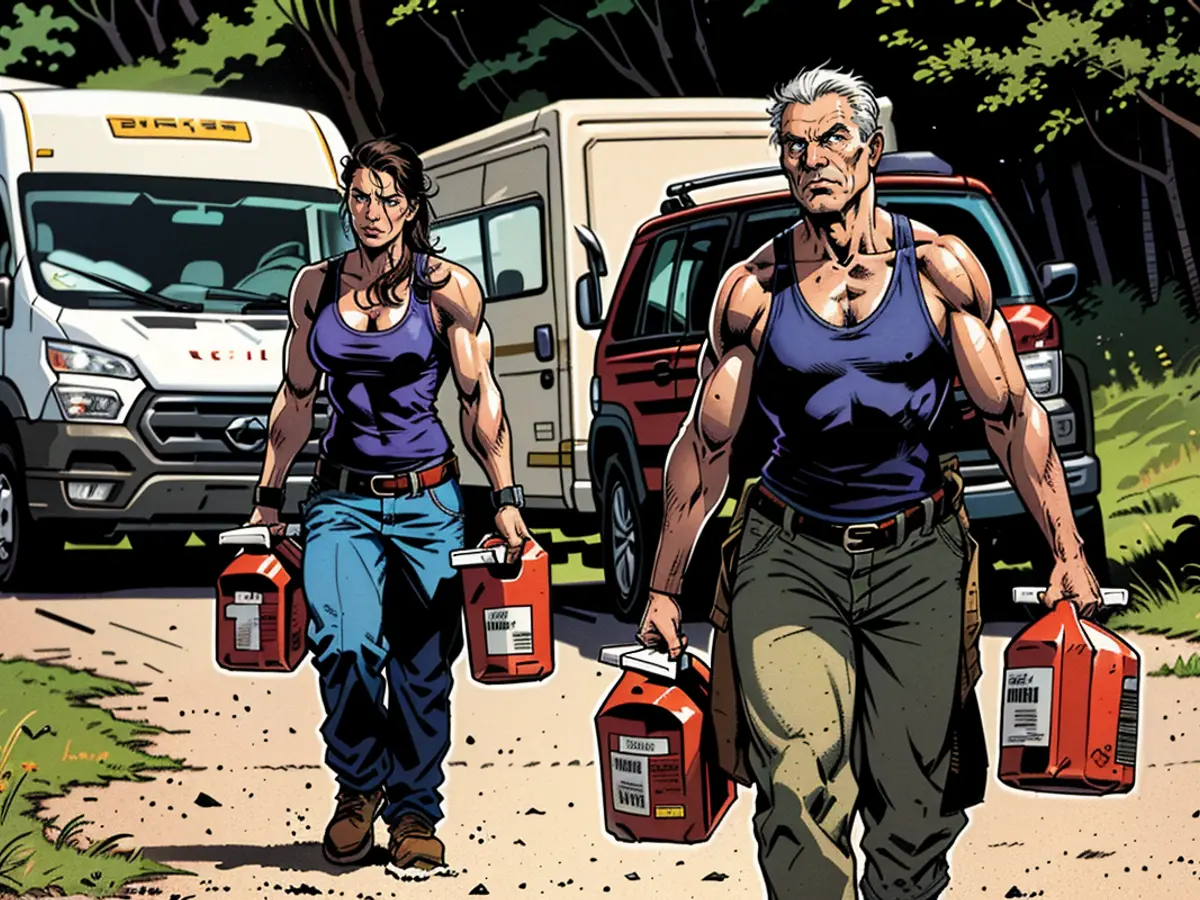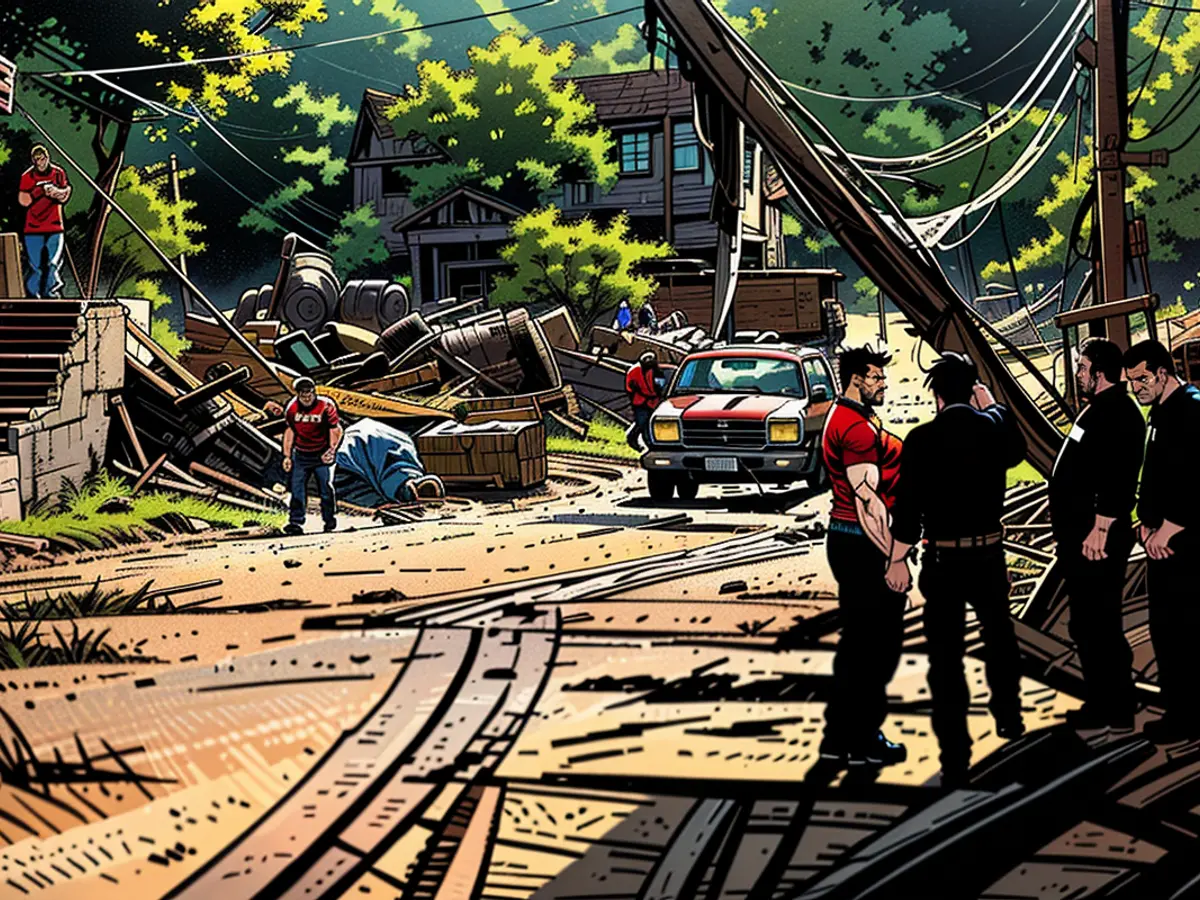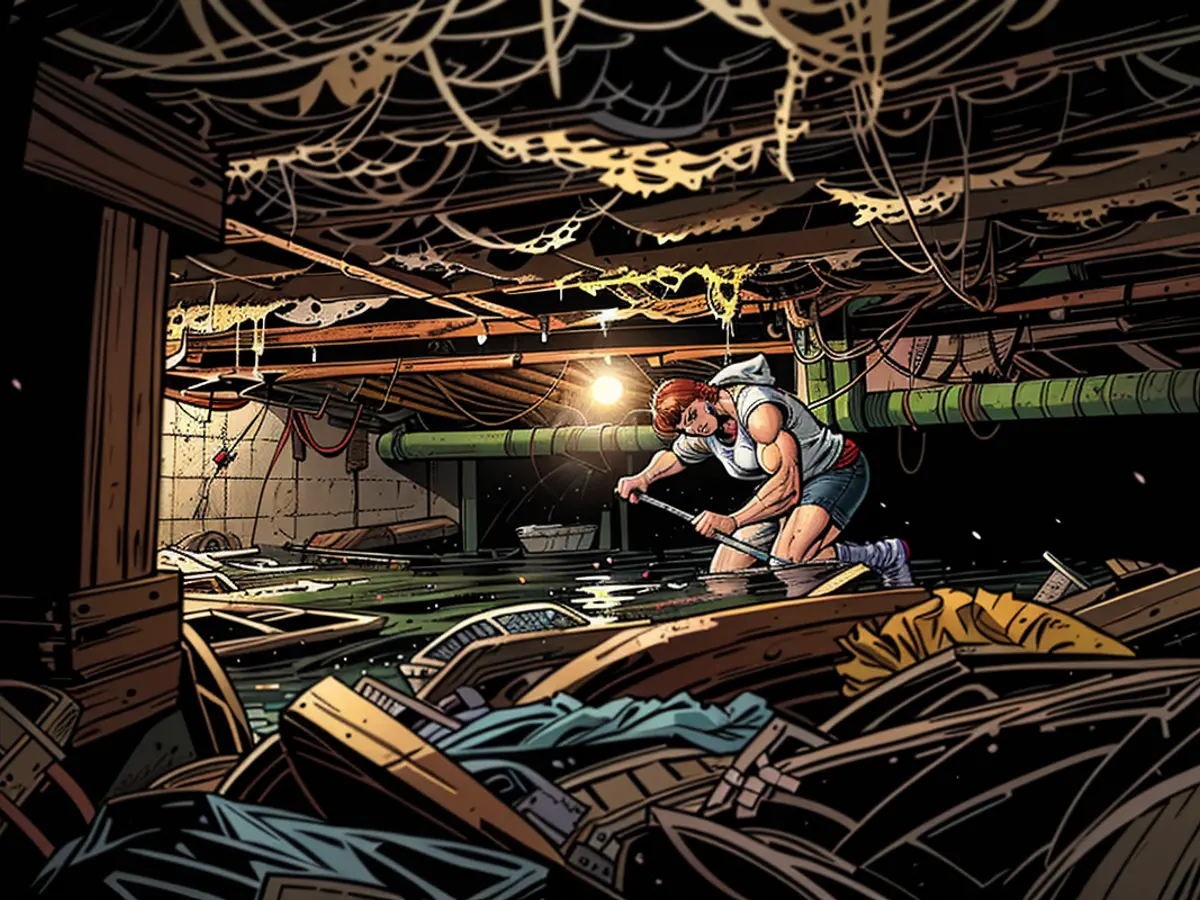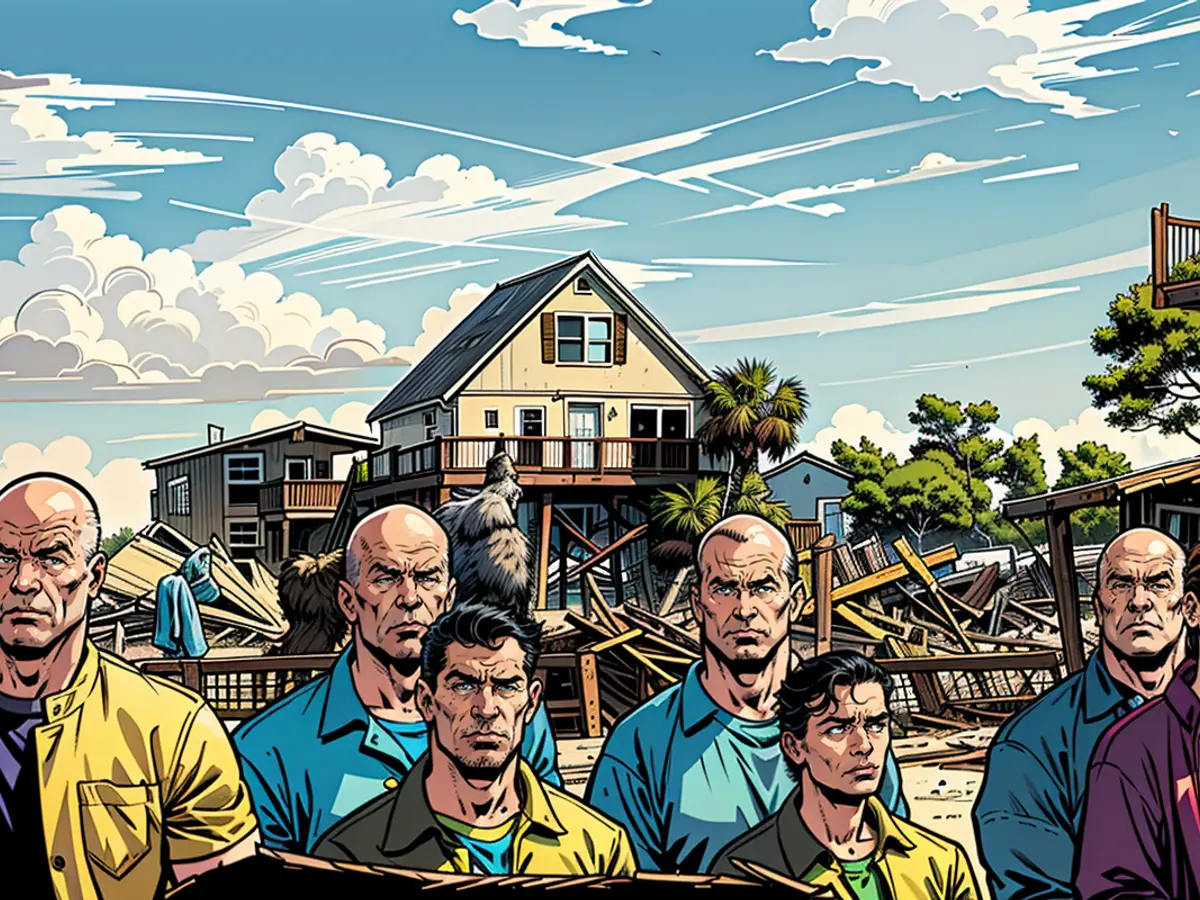After the tempest, Helene's bereaved individuals grapple with substantial losses and devastation, with at least 213 reported fatalities.
Daily searches for missing loved ones grow more desperate as authorities claim hundreds are unaccounted for, and rescue teams face challenges from cell service outages and wrecked roads and bridges.
People have trekked for hours to check on trapped relatives and spent torturous moments searching soaked river banks for those swept away along with their homes. In North Carolina's Buncombe County, home to Asheville, more than 200 people were unaccounted for by Thursday, with 72 bodies discovered so far, according to the county sheriff.
The extent of the damage becomes clearer as people regain access to their neighborhoods, only to find their houses in ruins or completely swept away by floodwaters.
A couple in Swannanoa, North Carolina, narrowly escaped last week when floodwaters surged into their home, turning their neighborhood into a river and dragging their vehicle down the street. Upon their return, they found their home turned upside down and covered in mud, nearly all their belongings destroyed.
"We lost almost everything we owned, including our vehicles," Joe Dancy told CNN's Laura Coates on Thursday night. "But we have the most important thing: our lives. And we are forever grateful for that."
Helene has become the deadliest hurricane to hit the U.S. mainland since Hurricane Katrina in 2005, with the death toll steadily climbing. North Carolina leads the way with 106 deaths, followed by 41 in South Carolina, 33 in Georgia, 20 in Florida, 11 in Tennessee, and 2 in Virginia, according to CNN's tally.

An extensive relief effort is underway in the region to restore shattered power grids and rebuild damaged water and cell infrastructure.
Transportation infrastructure in the region has suffered "unprecedented damage" after Helene demolished roads and washed out bridges, Polly Trottenberg, the deputy secretary of the U.S. Transportation Department, said Thursday.
Hundreds of roads remain closed, making it difficult to send aid to areas in dire need. And for those who left before Helene, the closures have delayed their returns to assess their homes, families, and friends. Some communities are so isolated that supplies are being delivered by mules and by air.
Power has been restored to more than 3.3 million homes and businesses, FEMA's director of individual assistance, Frank Matranga, said Thursday. However, more than 700,000 energy customers still lack power, according to PowerOutage.us.
"We understand that for many families, the journey to recovery begins with restoring power and reconnecting with loved ones. Restoring power and communication isn't just about enhancing comfort; it's about ensuring people's safety, keeping them informed, and enabling them to access necessary services," Matranga said.

Cell service is gradually returning, with fewer than half of cell sites still down on Thursday, Matranga added. SpaceX's Starlink satellite internet service has announced it will provide free service for 30 days in areas affected by Helene.
Bathing and washing dishes have become luxury items in areas where clean water is scarce.
In North Carolina's Buncombe County, residents rely on tanker trucks and shipments of bottled water for drinking water, but they struggle with water for daily activities. And in Tennessee, damage to water treatment and sewage facilities has prompted officials to ask residents in certain areas to save non-essential water and boil their drinking water.
An influx of federal resources and personnel has bolstered recovery efforts. Nearly 7,000 National Guard members have been activated to aid in the recovery, among other tasks such as water rescues, debris removal, search and rescue, and supply distribution. In North Carolina, guard members have been dropping supplies from the air and airlifting people and pets to safety.
FEMA funds are in short supply

FEMA has sufficient funds to provide immediate disaster relief following Hurricane Helene, according to an agency spokesperson, but with a long road to recovery ahead, and more hurricanes on the horizon this season, the agency may need to dip into its savings.
"FEMA has what it needs for immediate response and recovery efforts," FEMA spokesperson Jaclyn Rothenberg explained on Thursday, adding, "But we're not out of hurricane season yet, so we need to keep a close eye on it."
The statement comes after Homeland Security Secretary Alejandro Mayorkas told reporters on Wednesday that with another hurricane expected later in the year, "We do not have the funds. FEMA does not have the funds to make it through the season."
So far, FEMA has provided over $20 million in assistance to those impacted by Helene, Matranga said on Thursday.
President Joe Biden suggested earlier this week that he may ask Congress to reconvene during its October recess to approve emergency supplemental funding for storm recovery efforts.

"It can't wait. It can't wait. People need help now," Biden said Thursday when asked about the desired timeline.
Local businesses could bear the brunt of funding shortages. Funds for the Small Business Administration's disaster relief programs, which were bolstered in response to the Maui fires in 2023, are nearly depleted.
The White House warned last month that a short-term government funding bill sponsored by Republicans failed to increase funding for the SBA, suggesting that the agency's disaster loan program, which offers low-interest loans of up to $2 million, would cease operation due to a lack of funds.
A wedding rehearsal turned into a water rescue
As Helene passed, neighbors and onlookers sprang into action to help one another.

A wedding rehearsal in Grassy Creek, North Carolina, on a Friday was unexpectedly transformed into a water rescue scenario. This occurred when Eddie Hunnell, the groom's father, learned that a woman was trapped inside her house near the River House Inn, close to the river's edge.
Hunnell requested a life jacket, rope, and oar from the inn owner, as reported by CNN. After rushing outside, he came across Phil Worth, the woman's husband, who revealed that Leslie, his wife, was trapped inside their residence and couldn't escape.
Together, Hunnell and Phil boarded a canoe and strove to reach Leslie, but their efforts were futile.
"We were struggling to devise a plan to rescue her, and suddenly, we were running out of options," Hunnell recalled. "I was convinced the house would eventually collapse, and my main concern was that it would crash down on Leslie."
As the wedding party observed, the roof of another house drifted downstream toward Leslie Worth's home. Footage provided by the Hunnell family depicts the debris striking Leslie's home, causing it to tilt under the force of the surging floodwater, ultimately causing a piece of the home to break off.

"Leslie was standing there, waist-deep in water," Hunnell reported. "Everyone was shouting for her to dive into the water."
Hunnell attempted to navigate the canoe to Leslie but was unable to maneuver it effectively due to the rapid current and strong winds.
"So, I finally decided to jump in and swim to her," Hunnell admitted. "I'd been searching for a solution for thirty minutes and came up empty-handed. I was certain my wife would give me hell, so I jumped."
Upon reaching Leslie, Hunnell seized her life vest and urged her to kick fiercely toward the shore. Their joint efforts eventually led them to safer waters, allowing them to swim ashore.
Those awaiting on shore erupted into tears as the pair emerged from the water unscathed.

Hunnell eventually extended an invitation to the Worths to partake in the wedding rehearsal dinner. "They arrived wearing the apparel they'd been wearing all day. I believe we even managed to secure some new attire for Leslie, and some pants for Phil," Hunnell recounted.
The following day, the wedding went on with approximately half of the original guest list and no electricity, as more than 100 candles provided the lighting. Neighbors leveraged chainsaws to clear the roads.
"Despite the turbulent afternoon, the wedding went off without a hitch," Hunnell concluded. "The events leading up to the wedding could be described as a disaster."
CNN correspondents Kayla Tausche, Sam Fossum, Haley Talbot, Sara Smart, Emma Tucker, Andy Rose, and Steve Almasy contributed to this report.
Despite the challenges, many affected families are banding together to support each other. For instance, a group of us from Swannanoa, North Carolina, have been helping each other clear debris and rebuild homes damaged by the floodwaters.
In the aftermath of the hurricane, the communities in North Carolina's Buncombe County have relied heavily on each other for assistance. With thousands of homes destroyed and numerous roads closed, neighbors have been sharing resources and offering emotional support to those in need.









